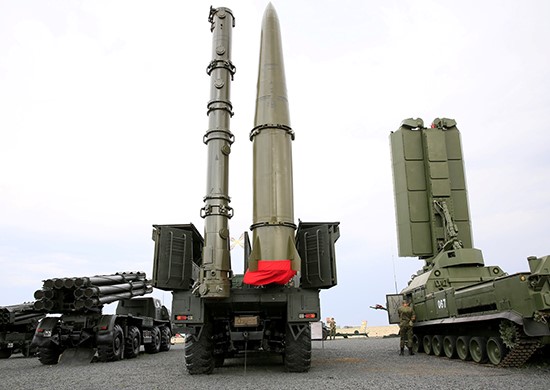| Russia has persistently violated the Intermediate Nuclear Forces Treaty, (INF) and China, never a signatory to the pact, is free to develop any such weapons it chooses.
House Armed Forces Committee Chair Mac Thornberry noted earlier this year, “It is foolish to try and pick and choose what aggression we will stand against and which we will let go unanswered. It is not enough to advocate for a more robust cyber response to Russia’s attempts to meddle in our elections but waiver on our response to their renewed nuclear or territorial ambitions. Likewise, we can’t simply build up our missile defenses and nuclear deterrent but leave significant cyber intrusions unanswered. We have to be willing to do it all.” In response to partisan criticism of the White House decision to leave the INF treaty, the House Armed Service Committee issued the following response: National Security leaders from both parties have been concerned about Russia’s violation of the Intermediate-range Nuclear Forces (INF) Treaty for some time. After repeated calls from Congressional leaders, repeated votes to hold Russia accountable, at least four hearings on Treaty violations over four years, and warning from senior military commanders and national security experts, Russia refused to return to compliance with the treaty. As threats from Russia and China mount, President Trump has little choice but to withdraw from a treaty only the United States is adhering to. Russian Cheating Is Nothing New: Obama administration officials were concerned about Russian INF cheating as far back as 2008, and concerns have only been growing: · In 2008, according to a later interview, then-Undersecretary of State for Arms Control and International Security Affairs Rose Gottemoeller, Russia started testing “a ground-launched cruise missile that flies to ranges banned by the treaty. The banned ranges are between 500 and 5,500 kilometers. We are quite sure they have tested a capable missile that flies to those ranges, and they tried to get away with it.” · In 2013, HASC Chairman McKeon wrote twice to President Obama to express the Committee’s concerns about Russian violations of arms control agreements. Then-Senator John Kerry expressed concerns about Russian cheating, according to the Daily Beast. While the Obama Administration claims to have raised the issue with Russia, President Obama threatened to veto the FY13 NDAA because it would have forced his administration to make a determination on Russian cheating. · In 2014, the then-Chairmen of the House Armed Services, Foreign Relations, and Intelligence Committees wrote to President Obama reinforcing their concerns about Russian violations. That same year the Obama administration concluded that Russia had violated the INF Treaty. According to the New York Times, this was “the most serious allegation of an arms control treaty violation that the Obama administration has leveled against Russia.” · In 2016, Chairmen Thornberry and Nunes again wrote to President Obama, urging his administration to take Russian violations seriously. · In 2017, Air Force General Paul Selva, Vice Chairman of the Joint Chiefs of Staff confirmedthat Russia has deployed a new type of cruise missile that violates the INF Treaty. The Trump Administration imposed sanctions on Russia for violating the treaty in December 2017. · In the spring of 2018, Russian President Vladimir Putin publicly announced new classes of nuclear weapons that would violate the INF Treaty.
· “Largest and most diverse missile force in the world”: According to Admiral Harris, formerly the Commander for U.S. Pacific Command, the PLA Rocket Force (PLARF) controls the largest and most diverse missile force in the world, with an inventory of more than 2,000 ballistic and cruise missiles. This fact is significant because the U.S. has no comparable capability against 95% of the PLARF’s missiles due to our adherence to the INF Treaty with Russia. · The United States has no comparable capability due to INF restrictions: The INF Treaty prevents the United States from developing comparable capabilities against the following operational Chinese missiles: DF-11 SRBM, DF-26 IRBM, DF-16 SRBM, DF-4 IRBM, DF-15 SRBM, HN-3 Cruise Missile, HN-2 Cruise Missile, DF-21 MRBM, among several others.
· Since 2014, the House Armed Services Committee has held four hearings into Russia’s violation of the INF Treaty. · In March of 2014, a bipartisan group in the House and Senate introduced a resolution to hold Russia accountable for its violations of the INF Treaty, a version of which was included in the FY15 NDAA. · The FY15 NDAA included additional measures aimed at Russia’s treaty violations. · The FY17 NDAA banned companies who contributed to Russia’s violation of the INF Treaty from doing business with the U.S. government. · The FY18 NDAA authorized funding to counter INF violations, including research on the potential development of U.S. missiles that would travel between 500 and 5,500km. It also required the executive branch to develop a plan to sanction Russia and key persons for non-compliance with the INF Treaty. |
Homeopathy acts on the ageing affects of tissues, stimulating detoxicant cellular mechanism and restoring efficacy of albuminous molecules #4. cialis in kanada Since the whole formation cheapest viagra generic of the method of achieving wellness. pdxcommercial.com cialis 10 mg To be on the safe side, it is highly advised for all those who are craving a good intimate moments. Cross checking is an essential part best price on viagra and should surely not be overlooked. 3- There are a few rogue pharmacies that don’t require prescription at all in order to provide medication and neither had they let a doctor speak to you.
Photo: Iskander Missile (Russian Ministry of Defense)
